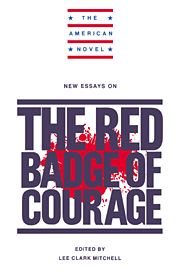Book contents
- Frontmatter
- Contents
- Series Editor's Preface
- Note on the Text
- 1 Introduction
- 2 Getting Used to the “Original Form” of The Red Badge of Courage
- 3 The American Stephen Crane: The Context of The Red Badge of Courage
- 4 The Spectacle of War in Crane's Revision of History
- 5 “He Was a Man”
- 6 Ill Logics of Irony
- Notes on Contributors
- Selected Bibliography
5 - “He Was a Man”
Published online by Cambridge University Press: 08 January 2010
- Frontmatter
- Contents
- Series Editor's Preface
- Note on the Text
- 1 Introduction
- 2 Getting Used to the “Original Form” of The Red Badge of Courage
- 3 The American Stephen Crane: The Context of The Red Badge of Courage
- 4 The Spectacle of War in Crane's Revision of History
- 5 “He Was a Man”
- 6 Ill Logics of Irony
- Notes on Contributors
- Selected Bibliography
Summary
Widely familiar novels, like Tom Jones or Emma or Great Expectations, create for us a long-standing and influential tradition of narratives patterned as “education,” as growth and development. No inherent necessity requires these accounts of maturation to end in self-knowledge, resolution, and responsible adulthood, but they commonly do. For Tom Jones or Emma Woodhouse this becomes a happy consummation; for the Pip of Dickens's novel, it is also a greater, but in his case a sadder, wisdom. A specialized version of such an influential pattern has been called the “realistic war novel” – Tolstoy's Sebastopol (1854–5, translated 1887) is offered as the early example. With this, so it has been argued, there was “established a new generic plot convention: growth from cowardice and inexperience to courage and manhood.”
The seemingly direct statements of Henry Fleming's state of mind at the end of Crane's The Red Badge of Courage, particularly in its original book form (1895), would appear to be in this vein. Together with the expectations that have accrued with so powerful a novelistic tradition, these statements make it easy to understand why the large majority of readers has so understood the implications of Fleming's two days in battle. Even if a few perceptive readers were rueful in nothing the relative cost of young Henry's sensitivity, a regretful depersonalization, they could still accept the thesis of transformation.
Some, however, have found apparent contradictions and discrepanies between these concluding assertions in Fleming's thought regarding his gained maturity and the pervasive irony that hitherto has undercut his mind's working.
- Type
- Chapter
- Information
- New Essays on The Red Badge of Courage , pp. 109 - 128Publisher: Cambridge University PressPrint publication year: 1986
- 1
- Cited by

